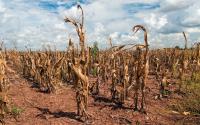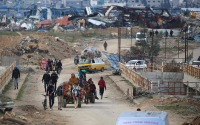8 November 2007The Guardian
 Australian farmer Wayne Dunford walks through his failed barley in Parkes, New South Wales. Photograph: Ian Waldie/Getty Images
Australian farmer Wayne Dunford walks through his failed barley in Parkes, New South Wales. Photograph: Ian Waldie/Getty Images
Australia's blistering summer has only just begun but reservoir levels are dropping fast, crop forecasts have been slashed, and great swaths of the continent are entering what scientists yesterday called a "one in a thousand years drought".
With many regions in their fifth year of drought, the government yesterday called an emergency water summit in Canberra. The meeting between the prime minister, John Howard, and the leaders of New South Wales, Victoria, South Australia, and Queensland was told that more than half of Australia's farmland was experiencing drought.
David Dreverman, head of the Murray-Darling river basin commission, said: "This is more typical of a one in a 1,000-year drought, or possibly even drier, than it is of a one in 100-year event." He added that the Murray-Darling river system, which receives 4% of Australia's water, but provides three-quarters of the water consumed nationally, was already 54% below the previous record minimum. Last month it recorded its lowest ever October flows. Inflow this year was just 5% of the average.
The drought is likely to affect drinking water supplies to many areas. Sydney's largest reservoir is now 40% full and many small rural towns in east Australia face shortages within a month.
It is also expected to have a serious impact on crops. Last week, the government forecast its lowest wheat crop for 12 years, a 62% decrease on last year. Yesterday the agriculture minister Peter McGauran announced the allocation of more than A$200m (£80m) to help businesses which service drought-stricken farmers, in addition last month to the A$910m in payments for 72,000 farmers affected by drought.
The drought has set off a fierce political debate in Australia about climate change. The country has maintained, with the US, a sceptical stance on the issue, and Mr Howard has refused to sign Australia up to the Kyoto agreement. However, polls suggest he is increasingly out of step with public and scientific opinion and the drought has forced him to demonstrate concern.
With an election due within a year and the environment emerging as a big political issue, Mr Howard last month announced several "green energy" projects. He now concedes that climate change is taking place but argues that the Kyoto process is flawed because it does not include the big polluters - India, China and the US. But last week new UN figures showed that Australia's emissions of greenhouse gases were the highest per capita in the west, apart from Luxembourg, and that they had grown by 1.5 tonnes a head since 1990.
Australia now emits almost as much carbon and other greenhouse gases as France and Italy, which each have three times its population.
In Kenya next week Australia will come under intense pressure from ministers of developing countries at the UN meeting on climate change. However, Mr Howard is not expected to change his position.
Adding to the government's embarrassment, the leading scientific body in Australia - the Commonwealth Scientific and Industrial Research Organisation - this week predicted that rainfall in parts of eastern Australia could drop by 40% by 2070, along with a 7C rise in temperature. It said that by 2030 the risk of bush fires would be higher, that droughts would be more severe and that rainfall and stream run-off would be lower.
Mike Young, a water management expert at the University of Adelaide, told Reuters this week that Australia's long-term climate was changing. "When the drought breaks we will not return to cooler, wetter conditions. It is the worst type of drought because we are not expecting to return back to the old regime. The last half of last century was much wetter. What we seem to have done is ... built Australia on the assumption that it was going to be wetter, and we haven't been prepared to make the change back to a much drier regime."
South Australia's premier, Mike Rann, said yesterday: "What we're seeing with this drought is a frightening glimpse of the future with global warming."
But Mr Howard played down the assessment that the drought was the worst in 1,000 years, saying he doubted if anybody really knew.






